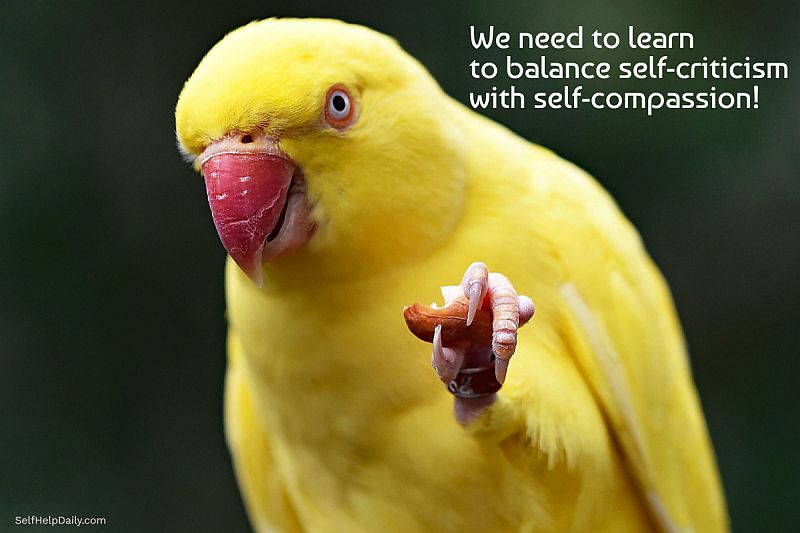by Sara Kaminski
Lots of people live with a merciless critic in their head who blames them for every single mistake, makes them remember every mishap and relive every embarrassment when they go to sleep, and constantly tells them they are not good enough. Some are always the punchline of every joke they make, even though, deep inside, they know there is nothing funny about diminishing oneself.
But that voice in our head that’s telling us we are not sufficient or acceptable is not something we are born with. It can be the result of adverse childhood experiences or even trauma, as well as other things that happened to us while growing up and becoming who we are now. This is not how it’s supposed to be.
In this article, we’ll discuss the ways in which we are too hard on ourselves, the origin of our inner critic, and the strategies to overcome it.
Recognizing When Your Self-Criticism Went Too Far
To be successful and fulfilled, we need to be realistic about our mistakes and flaws. However, we also need to know when our neutral self-criticism becomes excessively negative self-judgment.
This happens when you beat yourself up over slip-ups that have minimal consequences. For example, when you buy an expired yogurt or when you accidentally break a glass and make a huge deal about it.
A common symptom of being overly harsh on yourself is criticizing yourself even when you have corrected that mistake. The guilt eats you up for simple things like saying someone’s name wrong and apologizing endlessly because you can’t allow yourself to move on.
One of the most dangerous aspects of this problem is interpreting someone’s poor treatment of you as your fault. This can lead to you second-guessing every decision and diminishing your personality. Worse yet, it makes you susceptible to manipulation and emotional abuse.
If you don’t appreciate yourself enough, it’s quite common to see other people’s mistakes as plausible but yours as catastrophic.
Finally, even if you have everything going for you and your life is all sorted out, with this sort of attitude, you can still focus on tiny things that are not perfect and always feel like a failure.
What Is the Root of Your Self-Criticism?
The first place to look when asking yourself about the root of your inner critic is your childhood. If the early caregiver was unreasonably critical of themselves, some of those traits could be projected onto you. Also, if a parent, teacher, or older sibling was controlling, hard to please, disapproving, constantly comparing you to others, this could form your beliefs about yourself and leave scars on your self-esteem. Emotional, physical, verbal, or any kind of abuse in any life stage can contribute to low self-esteem.
Self-criticism is also a part of some cultures. Some people are raised in cultures where this is an effective motivator. This can be particularly true for women in certain patriarchal cultures. Often, this passes from generation to generation, and the parenting style keeps the self-doubt alive.
Modern culture is often blamed for unrealistic beauty standards, so this can play its role, especially in the teenage years.
Replacing Self-Criticism with Self-Compassion
Since this is an issue that usually begins in childhood, we have to emphasize how important it is that parents raise their children in a compassionate environment. It starts with the little things, such as learning to deal with school stress, and spreads out to more complex topics like learning to love oneself.
Things are more complicated for adults, of course. You already have your scars that need healing first so that you can start regaining your confidence.
- Start by writing down all of your self-deprecating thoughts. Once you have them down, perform a little ritual: destroy that paper. Rip it apart, feed it to the flames, flush it down the toilet. Be as dramatic as you’d like. Let this be a little cathartic act.
- Then, make a conscious effort to stop comparing yourself to others, especially to the perceived ideas of others presented on social media.
- Step out of your skin and observe yourself as a child you used to be or as a close friend. What would you say to them when they make a mistake or when they are not perfect? You would probably hug them or comfort them. So give yourself a hug. Comfort yourself.
- Make time for self-care. Find the activities that make you happy or help you relax. Set aside one day of the week or a couple of hours a day for these activities. You deserve this.
- Practice mindfulness to be in touch with your feelings and accept them fully.
In Closing
Finally, we can’t overlook how complex and tricky the human brain is. Negative criticism is linked to mental health issues, particularly anxiety and depression. If you feel like you can’t overcome this alone, don’t be afraid to ask for help. Therapists know how to create a non-judgmental and safe environment where you can confide and heal.


Leave a Reply